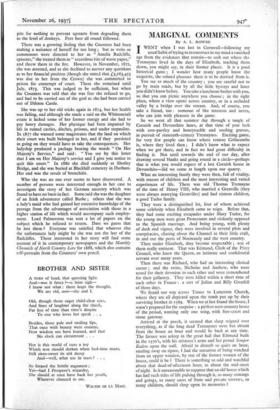MARGINAL COMMENTS
By A. L. ROWSE
I WENT when I was last in Cornwall—following my usual habit of trying to reconstruct in my mind a vanished age from the evidences that remain—to seek out where the Tremaynes lived in the days of Elizabeth, tracking them down, you might say, in their former places. It is a good historical game ; I wonder how many people know the exquisite, the refined pleasure there is to be derived from it.
You see so much of the country ; you are careful not to go by main roads, but by all the little byways and lanes you didn't know before. You take a luncheon-basket with you, so that you can picnic anywhere you choose ; in the right place, where a view opens across country, or in a secluded valley by a bridge over the stream. And, of course, you take a friend, too : someone of like interests and tastes, who can join with pleasure in the game.
So we went all that summer day through a tangle of Cornish and Devonshire lanes, at that time of year lush with cow-parsley and honeysuckle and seeding grasses, in pursuit of sixteenth-century Tremaynes. Exciting game, for very few people can know where remote Collacombe is, where they lived then ; I didn't know what to expect when we got there, and in fact we had great difficulty in finding it. Not until towards the end of our day, after drawing several blanks and going round in a circle—perhaps that is what you would expect of a lost Cornish house in Devonshire—did we come at length upon our quarry.
What an interesting family they were then, full of vitality, with masses of children and the most interesting and varied experiences of life. There was old Thomas Tremayne of the time of Henry VIII, who married a Grenville (they were always marrying Grenvilles) and had sixteen children, a good Tudor family They were a distinguished lot, four of whom achieved some celebrity when Elizabeth came to reign. Before that, they had some exciting escapades under Mary Tudor, for the young men were great Protestants and violently opposed to the Spanish marriage. And being young, with plenty of dash and vigour, they were involved in several plots and conspiracies, chasing about the Channel in their little craft, in and out the ports of Normandy and the west country.
Then under Elizabeth, they become respectable ; one of them really eminent. That was Edmund, Clerk of the Privy Council, who knew the Queen, an intimate and confidential servant over many years.
Then there was Richard, who had an interesting clerical career ; and the twins, Nicholas and Andrew, who were noted for their devotion to each Other and were remembered for their gallantry. They were killed within a short time of each other in France : a sort of Julian and Billy Grenfell of those days.
We found our way across Tamar to Lamerton Church, where they are all depicted upon the tomb put up by their surviving brother in 1589. When we at last found the house, I wasn't prepared for the surprise : a perfect west-country house of the period, wanting only one wing, with fore-court and stone gateway. Arrived at the porch, it seemed that sleep reigned over everything, as if the long dead Trem.aynes were but absent from the house an hour and would be back at any time. The farmer was asleep in the great hall that Edmund built in the 1570's, with his mistress's arms and her proud Semper Eadem upon the wall. Afraid to disturb so quiet an hour, stealing away on tiptoe, I had the sensation of being watched from an upper window, by one of the former women of the house, could it be ? There is something so odd and watchful about that dead-of-afternoon hour, as about the mid-most of night. Is it unreasonable to suppose that an old house which has had such tides of life pulsing through it, so many comings and goings, so many cares of State and private sorrows, so many children, should sleep upon its memories ?














































 Previous page
Previous page